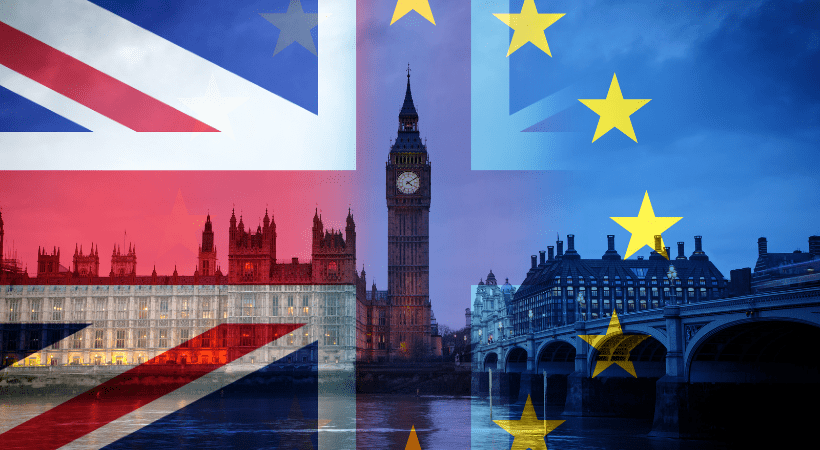‘Not for EU’ Labelling Explained
‘Not for EU’ Labelling Explained
The recent ‘Not for EU’ labelling seen on products sold in the UK is causing quite a stir for both industry and consumers. While there is currently no enforced law regulating ‘Not for EU’ labelling in the UK, the UK government has asked the industry to begin transitioning in preparation for the expected legislation in October 2024.
Our Regulatory Specialist, Rebecca Kaya has been following the story closely; here’s a quick-fire Q&A based on her insights from client queries and DEFRA trade group meetings:

Where did ‘not for EU’ labelling come from?
It’s an element of the Windsor Framework, a legal framework designed to support easier trade between the UK nations (Wales, Scotland, England and Northern Ireland) despite Northern Ireland being subject to EU product standard rules under EU regulations.
It creates a ‘green lane’ for certain goods travelling from Great Britain into Northern Ireland, so they face more streamlined customs processes for easier trade.
The UK and EU have a joint committee discussing how to practically implement the Windsor Framework. Within these conversations, the idea of the UK-wide & european labeling requirements, ‘Not for EU’ labelling, was born.
What is the purpose of ‘Not for EU’ labelling?
The idea of labelling not for EU on food throughout the UK Nations was proposed by the UK government to help make it easier to produce one label for all of the UK (Wales, Scotland, England and Northern Ireland) and to ensure the feeling of the unity of NI within the rest of the UK.
It enables the identification of products that are using the ‘green lane’ between GB and NI, thus enabling easier prevention of them crossing the border into wider EU markets, which requires more complicated customs processes now the UK is no longer a member state.
What legislation regulates ‘Not for EU’ labelling?
This is where things get complicated, a result of the hybrid nature of Northern Ireland – a part of the UK territory but governed by EU law.
In agreement with the UK, the EU has made the ‘Not for EU’ label a legal requirement under ‘Regulation (EU) 2023/1231 of the European Parliament and of the Council of 14 June 2023 on specific rules relating to the entry into Northern Ireland from other parts of the United Kingdom of certain consignments of retail goods, plants for planting, seed potatoes, machinery and certain vehicles operated for agricultural or forestry purposes, as well as non-commercial movements of certain pet animals into Northern Ireland’.
It’s solely required for products that are moving to NI from Great Britain (Wales, England or Scotland) to retail premises in Northern Ireland and moving under the Northern Ireland Retail Movement Scheme (NIRMS) sanitary controls derogations, ‘green lane no.1’, and now the customs green lane derogations, ‘green lane no. 2’. It has no relevance or impact on any other member states.
Following the release of the UK government command paper on the 31st of January 2024 and the subsequent return of the NI assembly on the 3rd of February 2024 the Regulations requiring the marking of goods in GB have now arrived in draft form, and consultation is now out on them for businesses to respond to until the 15th of March 2024. https://consult.defra.gov.uk/gb-mandatory-labelling-team/marking-of-retail-goods-consultation/
These are the ‘Marking of Retail Goods Regulations 2024’ which extend to England and Wales and Scotland and are proposed to enter into force on 1st October 2024.
However, as this is a labelling-related matter, the handling of regulation for the UK is devolved. To introduce the requirement for ‘Not for EU’ labelling across the whole of the UK for domestically sold foods, new regulations will also be required in the Welsh Senedd, The Scottish Parliament and in England through the UK government.
What about NI?
Prepacked foods ‘produced’ or dispatched from a NI-registered or approved food business (excluding prepacked foods originating from outside the UK) are not required to be labelled with ‘Not for EU’ label when they are sold in GB.
Why is it being introduced UK-wide?
One of the main points of contention is the UK government’s intentions to add not for EU-labelling to all products sold in England, Scotland and Northern Ireland, rather than limiting it to only those who trade with NI.
In May 2023 James Cleverly, then foreign secretary, said the labels would be required across the UK for “practical and philosophical” reasons. He stated that retailers wanted a common labelling regime across the UK. (John Campbell BBC News NI economics and business editor, 16 May 2023.)
In addition, the draft Statutory Instrument states that “A labelling requirement which applies only to goods on the market in Northern Ireland could create a disincentive for businesses and traders to place goods for sale on the Northern Ireland market“.
By implementing a UK-wide approach, the government hopes to prevent a disadvantage to Northern Ireland’s supply chain long-term. However, it will add costs for GB food business operators who will have to change labels.
What products does it apply to?
The labelling applies to products considered ‘high-risk’. This includes meat, dairy, fruit, vegetables, composite products and fish. The government has proposed a three-phase approach to the labelling of these products which details enforcement dates.
Does the ‘Not for EU’ labelling reflect the quality of products?
No. UK food regulations are comprised of mainly EU-retained regulations which means our standards are predominantly aligned to theirs at present. It is a matter of goods movement processes and making it easier to supply Northern Ireland with certain higher-risk food products from GB – where some rules on food movements differ.
Will there be a ‘Not for UK’ or ‘Only for UK’ label too?
There is no known action towards an equivalent label such as ‘Not for UK’ or ‘Only for UK’. This is because:
- Unity is important when it comes to labelling to prevent confusion.
- The rules under the EU Regulation have already been agreed upon by both parties, the UK and the EU. I.e. for the imposition of ‘Not for EU’ labelling for products moving to NI – changing would mean a regulatory rewrite.
- An approach like ‘Not for UK’ may require all 27 member states trading with NI to add this to their label, which is impractical and undermines the law’s purpose to improve trading specifically between GB and NI.
- Practically, ‘Only for UK’ would not help food businesses operating across markets in the same way ‘Not for EU’ UK-wide is unhelpful. It may, however, overcome some of the negative consumer perceptions that have arisen.
Rebecca’s Final Thoughts:
“There are many complexities around the issue. It may seem like a bit of food labelling, but in reality, you’re looking at a much wider political and constitutional matter. It’s a topic that is dividing the industry.”
Want advice on using ‘Not for EU’ labelling on your products? Get in touch with Ashbury to access support from regulatory specialists like Rebecca.
References:
https://news.stv.tv/scotland/scottish-government-raises-concern-on-not-for-eu-food-labelling-plan
https://www.politico.eu/article/uk-brexit-not-for-eu-food-label/

Author: Rebecca Kaya
I have dedicated over 17 years' of my career to keeping end consumers safe. As a Regulatory Specialist, I help clients to have confidence in their compliance by providing practical advice across the food chain - from the point of primary production, to final product labelling.
Next reads
What’s Next for Food & Drink? Our Experts’ Predictions for 2026
The Peanut Diaries: School and Social Occasions
The Peanut Diaries: Navigating Social Events and Celebrations with Food Allergies
The Peanut Diaries: A Parent’s Journey to Uncovering their Child’s Allergy
Keep up to date with our latest insights
Subscribe to our mailing list to stay in touch with the latest news, insights and updates from Ashbury




